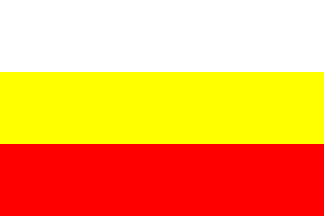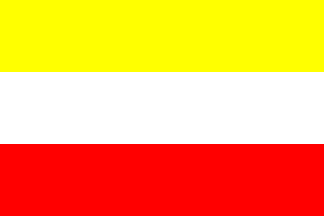
by Thanh-Tâm Le, 12 January 1999

Last modified: 2021-08-25 by rob raeside
Keywords: puerto rico | santa isabel |
Links: FOTW homepage |
search |
disclaimer and copyright |
write us |
mirrors

by Thanh-Tâm Le, 12 January 1999
See also:
This city of 20,013 inhabitants was founded on October 5, 1842
(others say 1776) The text says nothing special about the flag,
except that it can be decorated with sugar cane stalks [???],
although this is not compulsory.
Thanh-Tâm Le, 12 January 1999
The flag of Santa Isabel can also be flown showing a U-shape
wreath made of two sugar cane leaves in the center of the middle
stripe.
Blas Delgado

Wrong flag according to the image at Lexjuris
site
by Thanh-Tâm Le, 12 January 1999
The image at Lexjuris
site changes the order of colours mentioned in the text.
Thanh-Tâm Le, 12 January 1999
The white-yellow-red is the right one according to
pueblos-de-puertorico.com site (defunct).
Dov Gutterman, 6 Febuary 2000
The enamels or colors of the shield and the figures, allude to
the name of the town at the time of its foundation, its Patron
Saint and the supreme authorities, under which government the
Municipality of Santa Isabel was founded. Santa Isabel is
symbolized by the latin "I" and its crown of medieval
type. The red and silver colors, that are the old colors of
Hungary, represent the purity and charity; virtues that shone
more in the infuriate princess, Duchess of Turingia, by their
marriage and example of sovereign. The Apostle Santiago is
symbolized by scallop shells, also denominated in heraldic with
the Christian names of shells of Santiago or shells of Pilgrims,
because they were emblem of romeos, peregrinations and
sanctuaries in the Middle Age. In Spain, they got to identify
themselves as much as with the famous peregrinations to
Compostela, that became standard of this Apostle. The shells
recall, in addition, that the territory of Santa Isabel is rich
in archaeological deposits of the Taíno Indians, pre-columbian
inhabitants of Puerto Rico. These deposits, generally, are
denominated "concheros", due to the abundance of shells
and snails. In addition, it recalls that the sea that bathes the
coast of Santa Isabel, these shells were collected in abundance.
The colors red and gold of the shield and the crown, represent
the Spanish origins of the founders of Santa Isabel, and that the
town depended on Villa of San Blas de Coamo, whose Coat of Arms
has as dominant colors gold and red. The crown is standard of the
towns and municipalities. The sugar cane stems that surround the
shield, allude to the main agricultural product of Santa Isabel
and to elements characteristic of its landscape.
Nelson Román, 29 July 2004